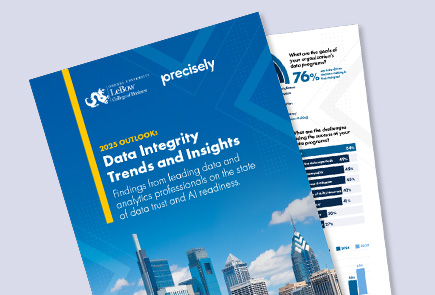
2025 Planning Insights: Data Governance Adoption Has Risen Dramatically

Key Takeaways:
- Interest in data governance is on the rise – 71% of organizations report that their organization has a data governance program, compared to 60% in 2023.
- Top reported benefits of data governance programs include improved quality of data analytics and insights (58%), improved data quality (58%), and increased collaboration (57%).
- Data governance is a top data integrity challenge, cited by 54% of organizations – second only to data quality (56%).
The 2025 Outlook: Data Integrity Trends and Insights report is here!
What are the latest data integrity trends you need to know about? How does your data program compare to your peers? Find out in the report, published in partnership between Precisely and Drexel University’s LeBow College of Business.
This year’s report is filled with actionable strategic insights from over 550 leading data and analytics professionals worldwide – and it’s going to be an essential resource as you plan your 2025 data strategy.
One key finding is around the growth in data governance adoption: 71% of organizations report having a data governance program in place this year, compared to 60% in 2023.
More organizations are prioritizing data governance programs to help improve data integrity, particularly as the majority of respondents (62%) report data governance as a top data challenge to artificial intelligence (AI) initiatives.
Let’s explore more of the report’s findings around data governance adoption. Stay tuned for future posts in our 2025 Planning Insights series, where we’ll feature even more takeaways from the report!
2025 Outlook: Essential Data Integrity Insights
What’s trending in trusted data and AI readiness for 2025? The results are in!
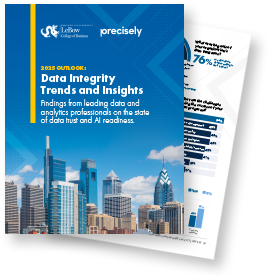
Data Governance Programs are on the Rise – and Adding Clear Value
Last year’s survey revealed that AI was creating a clear business case for data governance and speculated that this discipline was poised for growth. That speculation turned out to be correct – the 2024 survey results show a remarkable increase in the perceived priority and adoption of data governance.
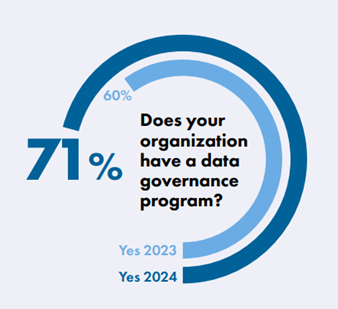
This year’s survey reveals that more organizations prioritize data governance, with 71% of global respondents reporting that their organization has a data governance program, compared to 60% in 2023.
Organizations that invested in data governance programs are reporting crucial benefits, including:
- improved quality of data analytics and insights (58%)
- improved data quality (58%)
- increased collaboration (57%)
- increased regulatory compliance (50%)
- faster access to relevant data (36%)
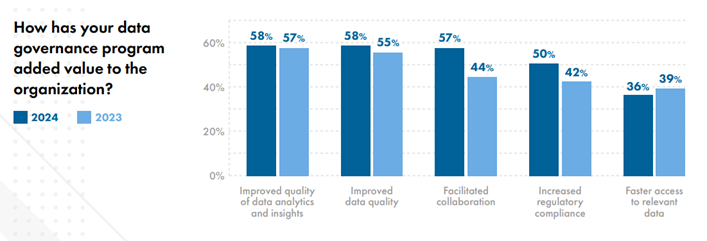
AI, Privacy Regulations, Compliance Demands, and More are Driving the Demand for Data Governance
The priority of data governance for improving data integrity has increased from 41% in 2023 to 57% in 2024. This is likely driven by various factors. To name a few:
- privacy and security considerations
- compliance demands
- interest in emerging data management architectures like data mesh and data fabric
- increased AI adoption
The findings show that data governance is the most-cited data challenge inhibiting progress toward AI initiatives (62%). This could be attributed to the need to understand and ensure the lineage and quality of the data used to train AI models, and regulatory demands to ensure data privacy and security.
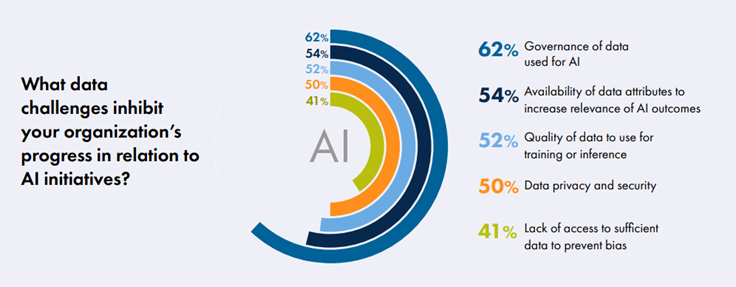
The demand for data governance is also driven by data privacy and security, which are in the top three priorities for improving data integrity in 2024 (45%).
What else is influencing this growing interest in data governance?
Modern data management architectures
This year, data mesh and data fabric moved forward as trends influencing data programs, jumping five percentage points from 13% in 2023 to 18% in 2024.
Fueled by businesses’ demand for democratized, self-service data, these architectures rely on effective metadata management and data governance for success.
It follows that 25% of respondents identify a data catalog as a top priority for 2024. Data catalogs are a new addition to this year’s list, and their appearance makes sense given their role in helping analysts and data scientists easily discover and understand the data available for analytics and AI success.
Regulatory compliance
Forty-five percent (45%) of respondents report that regulatory compliance is a goal of their governance program. With the increasing number of global regulations and increased strength of regulations related to personally identifiable information (PII), it’s again no wonder that the interest in data governance has grown so significantly.
However, data governance can be complicated, and teams must manage the complexities of diverse data sources.
Data integrity
In this year’s survey, 54% of respondents report data governance as a top data integrity challenge, second only to data quality (56%). This is up three spots from the 2023 survey, where only 27% prioritized it as a top challenge.
Data governance is seeing remarkable growth – propelled by a convergence of evolving business needs and advancing technical trends that reflect its increasing importance in organizational strategies.
That being said, this progress also highlights the need for a heightened focus on overcoming the complexities of implementing and maintaining a robust data governance program to ensure its effectiveness and sustainability.
Elevate Your 2025 Data Strategy
How does your data program and level of AI readiness compare to your peers’? Do you have the data integrity needed to achieve and exceed your business goals? Get all the insights and inspiration you need for a winning data strategy in the 2025 Outlook: Data Integrity Trends and Insights report.
And, stay tuned for the next 2025 Planning Insights blog to explore more report highlights!
